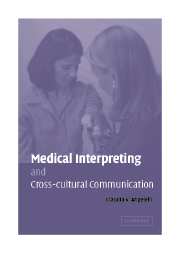Book contents
- Frontmatter
- Contents
- List of figures
- List of tables
- Acknowledgments
- List of abbreviations
- Prologue
- 1 Questioning invisibility
- 2 Communication in the medical encounter
- 3 A different set of lenses
- 4 California Hope: a public hospital in changing times
- 5 Putting it all together
- 6 Finding visibility
- 7 Interpreters' voices
- 8 Emerging metaphors and final words
- References
- Index
4 - California Hope: a public hospital in changing times
Published online by Cambridge University Press: 22 September 2009
- Frontmatter
- Contents
- List of figures
- List of tables
- Acknowledgments
- List of abbreviations
- Prologue
- 1 Questioning invisibility
- 2 Communication in the medical encounter
- 3 A different set of lenses
- 4 California Hope: a public hospital in changing times
- 5 Putting it all together
- 6 Finding visibility
- 7 Interpreters' voices
- 8 Emerging metaphors and final words
- References
- Index
Summary
To encompass in research the process of a given thing's development in all its phases and changes – from birth to death – fundamentally means to discover its nature, its essence, for “it is only in movement that a body shows what it is.” Thus, the historical study of behavior is not an auxiliary aspect of theoretical study, but rather forms its very base.
Lev Vygotsky, Mind in Society (1978: 64–5)Understanding the complexities of medical interpreting and the different roles interpreters play requires contextualized study of naturalistic data over an extended period of time. This chapter will describe how these topics are explored through an ethnography performed in a public hospital. The first part of the chapter will explain the reasons for choosing a medical setting over any other. Next, the process of obtaining consent will be described. Then, the study itself will be presented, beginning with a brief description of the city in which the site is found, the site at large (California Hope), and the informants at the specific site (the interpreters at Interpreting Services).
Finding a study site
In choosing a site, the next logical step was to look for one in which access to a wide array of interpreted medical interactions would be available. In this sense, California Hope (CH) emerged as a unique site, since the number of ICEs (both face-to-face and over-the-speakerphone) carried out per day at CH is astonishingly high.
- Type
- Chapter
- Information
- Medical Interpreting and Cross-cultural Communication , pp. 44 - 57Publisher: Cambridge University PressPrint publication year: 2004



